- Home
- Ben Reeder
Zompoc Survivor: Chronicle: A Zompoc Survivor Boxed Set Page 13
Zompoc Survivor: Chronicle: A Zompoc Survivor Boxed Set Read online
Page 13
“I had keys to all the doors when I worked here,” I explained. He gestured to one of the men behind us, and one of them shuffled forward to kneel by the door. He pulled a slim case from his pocket and drew two tools out, then went to work on the lock. A few seconds later, he was pulling the torsion bar to the side and the door opened onto another utility room and cooler air. The steps heading up to ground level was as welcome a sight as I’d ever seen, and I made a beeline for them.
“Where are we?” Adams asked.
“Greenwood Laboratory School, just across the street from Hammons and Hutchens Halls.”
“Where is that compared to the parking garage by the big performing arts hall with all the glass and the fountains out front?” the colonel said.
“About a block south and a couple of streets west of there. There’s a church between here and there. Last couple of big churches I saw weren’t pretty.” The colonel’s face fell and he nodded.
“I know, son. We had to deal with that ourselves. And you’re right, it wasn’t pretty.” The rest of the team nodded at that and made some affirmative sounding noises, which made my respect for them go up a notch or ten. I’d only seen it from a distance. They’d probably seen it much closer.
“Well, if it’s all the same to you guys,” I said, “I’m heading my own way after we get outside. Nothing personal, but our last meeting didn’t end well, and you know where to go from here so it’s not like you need me.” Six pairs of eyes suddenly shifted away from me, and someone cleared their throat. I was about to head for the door when the colonel stepped in front of me.
“Keyes ordered him to kill you and the girl with you,” he said sternly. “So don’t be too hard on Captain Adams or his men. He saved your life.”
“And he just saved ours without knowing that, sir,” Adams said. “I think he’s more than earned the right to be as hard as he wants.” Schafer scowled at Adams over that, then turned to me.
“I can’t argue with that. If you want to go your own way, I have no issue with you doing that. But, you did save my life and the lives of my men. You’re a damn fine shot and you’re cool under pressure. The least I can do is offer you a place on one of the evac choppers.” My heart skipped a beat at the offer. I couldn’t even bring myself to feel guilty about being tempted. Besides, it was one thing to be tempted. It was another thing entirely to give in to it.
“Colonel, I’m all misty eyed with gratitude for the offer. I really am. There’ll be tears later on, I promise. But I’d be breaking my last rule of survival if I took you up on that. Rule twenty two: Watch out for your family and your friends. So, thanks, but no. I’ve got people waiting for me. I can’t let ‘em down.”
“I understand, son. A man has to keep his promises.” He stuck out his right hand and I took it. His grip was like iron, but he didn’t play the squeeze game most macho guys seemed to. “It’s too bad you enlisted in the Air Force. You’d have made a damn good soldier.”
“Thank you, sir. Let’s get you out of here. I don’t know about you, but I have places to be.”
“Hoo-ah!” one of the Green Berets said softly.
Chapter 11
Homecoming
You never know what events are going to transpire to get you home.
~ Og Mandino ~
The back streets of Springfield were empty on my trip home. From the looks of things as I’d made my way east across National, something had drawn every zombie and ghoul in the area to Plaster Stadium. My bet was that the something was Mike Deacon. He’d done almost as much to help me get home as Adams and his team had before we split up at Greenwood. I had five extra magazines for my SOCOM riding in my assault vest and a handful of First Strike rations in the rucksack on my back. Most importantly, at least to me, I had two challenge coins in my pocket, both passed to me when I’d shaken hands with Adams and Colonel Schafer. Between the two of them, I’d probably be set for drinks for life if I ever set foot in a bar again.
For the first half hour, I could hear the sound of helicopters lifting off and the faint rumble of diesel engines, but as I walked down Lombard Street, those sounds became fewer and fewer. Gunshots peppered the night, and the smell of smoke was on the cool breeze that came out of the southwest. As I got within a hundred yards of Glenstone, the last large road I had to cross on the way home, I heard the sound of metal and glass hitting something hard, and the boom of a transformer going up. When I came up beside a store specializing in fur coats, I could see a long swath of darkness to the south of me. Cars were nose to tail heading north along this stretch, but the southbound lanes were mostly clear. There were still no zombies or ghouls in the area, at least that I could see or hear, so I crouch-walked across the empty lanes to the narrow gap between a Mazda and a Cadillac. There wasn’t enough space to squeeze between them, so I jumped on the Mazda’s hood and crossed it in two steps before I jumped across to the trunk of a sedan. Then I was jumping back down on the concrete and hustling between two squat stone buildings. My path took me through the dusty driveway of Glenstone Block and by the fire-gutted remains of the building that used to house the tile and stone store. From there, I crossed the railroad tracks and found myself in a storage yard.
Even though I was in decent shape, I had to stop and take a break for a few seconds. It was one thing to walk five miles, it was another to do it hauling thirty pounds of gear and ammo. It had been a good four years since I’d had to do that.
“At least it’s cooler than Baghdad,” I said softly after I took a pull from the straw of my camelback. Then it was time to move again. Without a vehicle, I could cut between houses and across lawns, which cut a lot of distance off my trip. Without a ton of zombies wandering around, I could move a lot faster as well. Ten minutes later, I was cutting across Barnes Street and heading down the driveway of someone’s house, then climbing the back fence and heading out between two houses at the end of a cul-de-sac. I didn’t bother to read the street sign as I crossed the street that T-ed into the cul-de-sac. It was what was beyond it that I was heading for. Once I hopped the short fence in the back of the next yard, I was off the streets, and into undeveloped brush. This was Carver Park, and it ran almost all the way to Oak Grove. No houses, no people, just pure landscape between me and the road for about a quarter of a mile.
Once I was out of sight of the road and street lamps, pitch darkness ruled the night, so I pulled out my flashlight and turned it on. The red light was just enough to see by and to avoid getting poked in the eye by any low hanging tree limbs as I kept heading due east. I finally broke out into an open field, which made the going much easier until I got to the far side. A little searching revealed the trail I’d found a year before that led out to a vacant lot on Oak Grove. From there, it was less than three blocks to my street, but unlike every other trip home, I wasn’t going to be aiming for the front door.
Instead, I passed my street and took a small drive that ran between two other houses off of Oak Grove into another small park nestled in the center of the block. If you didn’t know about it, you might miss it. The street lamps were still working here and the neighborhood still had lights on, which made navigating without the flashlight a lot easier. With a bittersweet feeling, I unlatched the back gate to our yard and slipped inside. Our shed was on my right, with the big oak tree that I’d built Amy’s tree house in on my left. The house was dark and quiet, but I wasn’t taking chances. As quietly as I could, I went around to the side of the house and peeked over the fence at the front yard. Karl’s truck was backed up against the front door, and Porsche’s was in the driveway with Cassie’s Wrangler behind it. I didn’t see any vehicles along the street that I didn’t recognize. One of the neighbor’s cars was halfway through his garage door, and I could see movement in the car itself. A bicycle was laying in the middle of the street, and I didn’t want to look too closely at the asphalt under it, for fear that the dark spot under it would resolve itself into a blood stain and drag marks.
I hopped down from the
fence and made my way to the back door, reclaiming the hidden key I’d hung on a nail on one of the fence posts. A big bowl of cat food and another filled with water were on the porch, a sure sign Maya hadn’t been able to find Leo, our big orange tomcat. The back door opened quietly, and I pulled the SOCOM before I ducked in and moved to one side, ending up beside the refrigerator. For a moment, I just listened. It was quiet and it stayed that way for a count of one hundred, then two hundred. If anyone had been here, they were probably gone. Of course, right now, anyone who might have thought about causing us trouble had other problems trying to eat them. Still, I wasn’t about to stick around and make myself an easy target. I stood up and checked the living room, then did a quick look-through of the rest of the house. The key rack by the front door was empty, and the pantry had been methodically stripped, including the five gallon buckets of staple foods and the empty water jugs. Most of the photos were gone from the top of the entertainment center, with the frames left empty. Finally, I took a look in the garage, and only saw one bike hanging from the hooks in the ceiling. Once I was confident no one was lurking, I went back to our bedroom with a lighter heart. Maya had followed the plan and bugged out like I figured she would as soon as Cassie and Porsche had shown up.
Aside from the obligatory bed and dresser, Maya’s and my room held one other feature of note: bookshelves. Before we’d bought our e-readers, we had invested heavily in paperback books, and thus, bookshelves. Aside from the two large shelves in our room, there was another one in the spare bedroom. We had enough books to stack them two high and two deep in the shelves, which made for great camouflage. I went to the shelf on the right side of the room as I stepped in and knelt down. Behind the books on the far left side was our fireproof strongbox. I grabbed it and headed for the kitchen. The strongbox made an audible clunk as I set it on the counter, then I turned to the freezer. Maya had one of the keys on her keychain, and we had kept another hanging on the key rack by the front door. We also kept a spare hidden in the freezer, encased in an ice cube at the bottom of the tray for the ice-maker. A few whacks with the meat tenderizer freed it, and I unlocked the strongbox moments later. Inside was half of the stuff I’d stashed in it. Ten silver ounces, three hundred rounds of .22 long rifle ammo, fifty rounds of .45 ACP and a set of unmarked keys were left. Maya would have the same stuff on her, except for the keys. Now I had almost everything I needed to bug out. I really wanted a hot meal, a hot shower and a few hours of sleep, but like the old poem went, I literally had miles to go before I slept. Of the three, all I was likely to get right now was a lukewarm meal.
I stowed the stuff from the safe and left it on the kitchen table, then opened the refrigerator. The big pot of Maya’s chili was still there, though much depleted since I’d been at it last. A handful of crushed up Fritos and some shredded cheese before it went into the microwave added texture and…well, cheese, which I’d never known to make a meal any worse. When the microwave beeped, I took the steaming bowl and sat down at the kitchen table to eat, probably for the last time. It was a bittersweet moment. I was finally home, my destination since sunset yesterday, and I was alone. Worse, I was going to have to bug out and say goodbye to the home Maya and I had made over the past two years. When I’d prepared for this moment, I had always imagined us doing that together, which somehow took a little bit of the sting out of it when I thought about it.
My maudlin ramblings came to an abrupt end when I heard the back door thump against the jamb. The SOCOM was in my hand as my head came up, and the door rattled again. Only one creature on Earth without opposable thumbs was that insistent, and the thought brought a smile to my face as I went to the back door and looked through the glass panes. Sure enough, Leo was sitting on the porch, looking up at me with a fierce feline scowl, as if to say “Let me in asshole.” I opened the door and he sat there for a moment, as if suddenly undecided about whether or not it was open wide enough, or if he really wanted in. Then he jumped across the threshold and head-butted my shins. I closed the door behind him and reached down to scratch the top of his head, but he had other ideas. As soon as I bent over, he reared up on his hind legs and put his front paws on my thigh. Leo is a big cat, and when he leans against you, you know it. When he wants up, there were two stages. This was the first one, the gentle request, which was to say, he hadn’t pulled his claws out and started climbing up my side. My face broke into a smile as I pulled him up and he immediately planted his furry forehead against my cheek. There was a deep rumble like a chainsaw idling, his version of purring, and he curled up into the crook of my elbow, his favorite sleeping spot since Maya had first rescued him as a kitten two and a half years ago. Back then, he’d barely filled the palm of my hand. Now he felt like fifty pounds of orange fur and attitude snuggled up against me.
“I’m glad to see you,” I told him as I felt my chest tighten. Maya and I had both had a soft spot for animals, and I knew it had to have been rough for her to leave without being sure of Leo’s fate. I swear, he must have gotten a stray hair in my eye, because I had a moment of blurred vision. A furry paw reached up and tapped the side of my face before he head butted me again. Usually that was a reminder that I’d stopped petting or scratching far too soon, but just then, I could have sworn he was as happy to see me as I was to see him.
“You ready to get the hell out of here, ya big furball?” I asked. He answered me with a sort of purring chirp, and didn’t protest when I set him down. Maya and I had planned for bugging out together and separately, and at the moment, I couldn’t have been happier for it. I knew she was as safe as was possible right now, and she knew I would catch up to her if I could. Leo followed me as I went out to the shed and grabbed the shovel, then trotted along beside me as I went back to the garden along the west fence. We had sectioned it off from the rest of the yard with heavy, untreated railroad ties. With a tired creaking of my knees, I knelt down beside the one on the south side of the garden and flipped it over. Then, I started to dig. About a foot down, the shovel hit what I was looking for with the thump of metal against plastic. I tossed the shovel aside and started scooping dirt out with my hands until I had uncovered a four foot long line of black plastic tarp. It parted easily under the combat knife in my vest, revealing a six inch wide gray plastic tube with a thick nylon strap laying along its length. A little tugging pulled the whole thing free from the dirt. Underneath it was a quarter section of pipe that I’d cut a one inch square into. I grabbed it and brought both pieces inside. The section of pipe fit neatly over the cap at one end, and with some effort, I unscrewed the end to reveal the contents of my bug out cache. Inside was my Ruger 10-22, my venerable Colt M1911A1, a sword and a set of knives, three home made MREs, a Lifestraw and my basic survival kit. I opened the survival pouch and checked that everything inside was still in good shape. The poncho and mylar survival blanket were intact, as was the black canvas Direct Action Response Kit I’d bought from Dark Angel Medical. The DARK Kit was a stripped down, bare essentials kit with a tourniquet, shears, and the basic bandages necessary for serious wounds. It also had hemostatic gauze, a specially treated bandage that promoted quick clotting. It wasn’t what Maya called a ‘boo-boo kit’ that you used for minor cuts and bruises. This one was for the serious stuff: gun shots stab wounds and major lacerations. It was the one kit I never wanted to have to use, and the one I was the most grateful to have. A flick of the disposable lighter produced a good flame on the second try, and the survival matches looked good. When I pulled out the chemical hand warmers, the seals were still intact, and the Mag light worked once I put the batteries in it. Food, water, shelter and light were all covered. The next part was defense.
I had stored the Ruger and the .45 field stripped, with a .22 revolver stashed intact with them just in case. I had the two guns reassembled and ready to load in about ten minutes. The Ruger had six magazines, the pistol had four. The cache had been stored with 100 rounds for each inside it, and a multi-tool for good measure. Each magazine was loaded slowly, eve
ry round checked before it went in the mag. The Ruger 10-22 was a fine little rifle. Lightweight, reliable and infinitely customizable, it had become the mainstay of my small arsenal. I had added a quick release lever for the magazine and a four power scope to mine. My .45 had been my grandfather’s, and it had been given to me in his will. I’d grown up shooting that gun, and it had yet to let me down. It hit like a Mack truck, and it was deadly accurate. Finally, I pulled out the blades.
When I had bought them from Zombie Tools a year ago, the last thing I had on my mind was actually fighting zombies with them. I’d grown up with the idea that there was no excuse not to have a sharp knife on you at all times. In Missouri, like most of the Midwest and South, it was just something a man always had on him, whether it was a pocket knife or a fixed blade. Thus, the ZT Tainto was a must. Fourteen inches and fifteen ounces of 5160 carbon steel, it had been the first blade I had bought from Zombie Tools, and it had been hard to put it away in the cache. The second blade, though, was the one I found my hands itching for since I’d realized I was in the middle of a zombie apocalypse. Called the Deuce, it was as close to indestructible as I had ever seen, just tip heavy enough to hit like a sledgehammer but not as clumsy, and light enough to swing all day if I needed to but heavy enough to cut through most things. Right then, it definitely lived up to the Zombie Tools slogan “A fist full of fuck yeah.” The last blade was actually six blades, two sets of ZT Spikes, throwing knives that could also be turned into rope darts with a few feet of paracord. I had picked them up for hunting small game and as a deterrent. The Tainto went on my belt, and I stowed four of the six ZT Spikes in a pocket on the tactical vest. The other two went in the leather sheath I’d made for them. Finally, I slung the Deuce in its Kydex sheath across my back. The SOCOM stayed on my leg, and the Colt’s holster went on the vest, under my right arm. The Ruger I just slung over my shoulder. Armed and moderately prepared, I went back into the bedroom and opened my closet door.

 True Colors (The Demon's Apprentice Book 6)
True Colors (The Demon's Apprentice Book 6)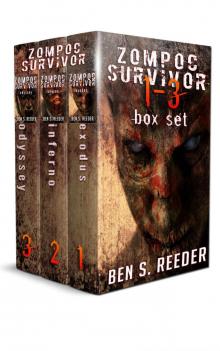 Zompoc Survivor: Chronicle: A Zompoc Survivor Boxed Set
Zompoc Survivor: Chronicle: A Zompoc Survivor Boxed Set Charm School (The Demon's Apprentice Book 4)
Charm School (The Demon's Apprentice Book 4) Page of Swords (The Demon's Apprentice Book 2)
Page of Swords (The Demon's Apprentice Book 2)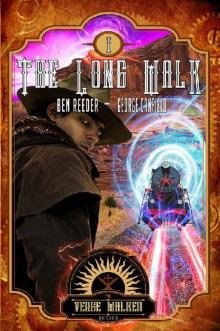 The Long Walk (The Verge Walker Book 1)
The Long Walk (The Verge Walker Book 1) Vision Quest (The Demon's Apprentice Book 3)
Vision Quest (The Demon's Apprentice Book 3) In Absentia: A Demon's Apprentice Anthology
In Absentia: A Demon's Apprentice Anthology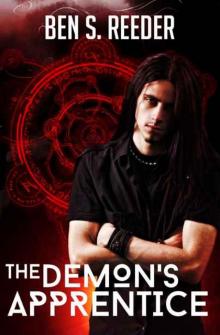 The Demon's Apprentice
The Demon's Apprentice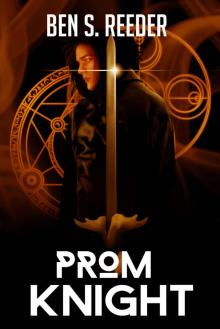 Prom Knight
Prom Knight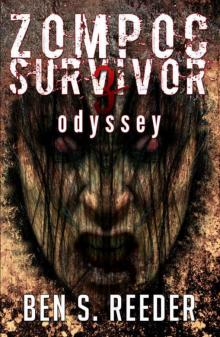 Zompoc Survivor: Odyssey
Zompoc Survivor: Odyssey